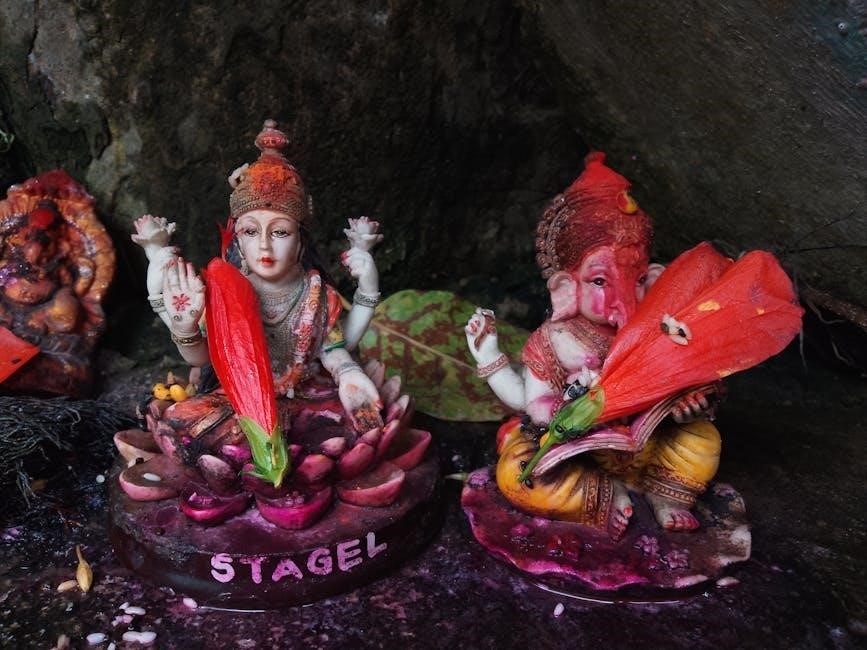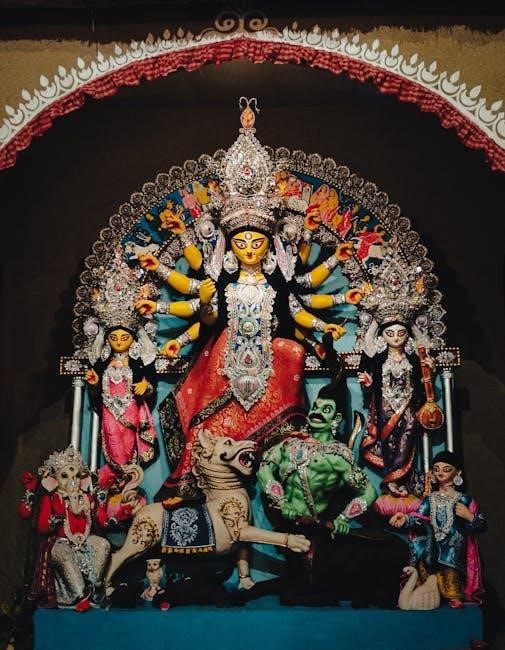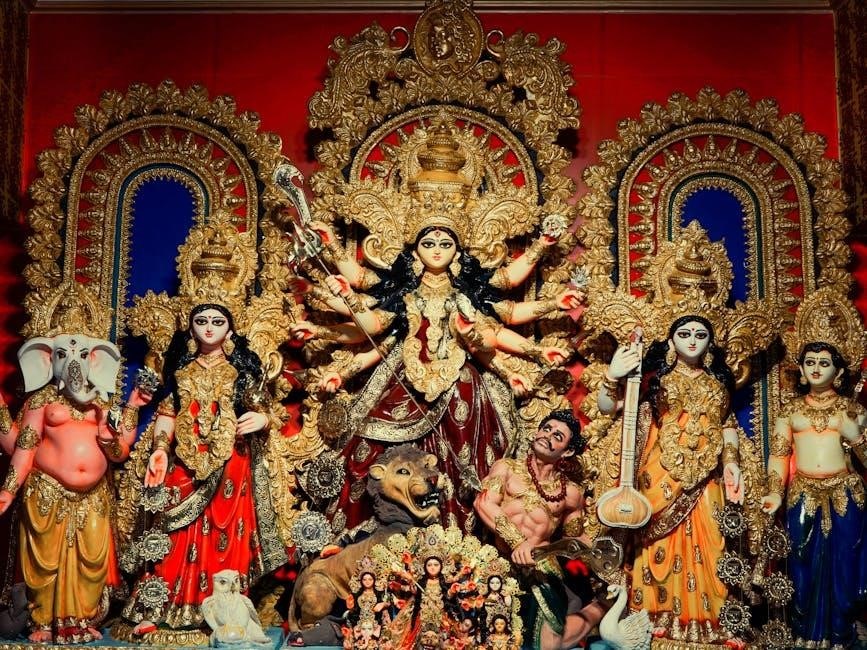Lakshmi Ashtakam, a devotional hymn dedicated to Goddess Lakshmi, is a sacred prayer composed by Lord Indra. It is an eight-verse poem found in the Padma Purana, offering divine blessings and prosperity. Available in Telugu PDF, it is widely revered for its spiritual significance and poetic beauty.
1.1 Overview of Lakshmi Ashtakam
Lakshmi Ashtakam is a sacred hymn dedicated to Goddess Lakshmi, the deity of wealth and prosperity. Comprising eight verses, this prayer is a heartfelt invocation to seek her blessings for a life filled with harmony and abundance. Each verse glorifies her divine attributes, emphasizing her role as the embodiment of fortune and wisdom. The hymn is structured to reflect devotion, gratitude, and the pursuit of both spiritual and material well-being. Its verses are rich in poetic imagery, celebrating Lakshmi’s grace and her presence in everyday life. The Telugu version of Lakshmi Ashtakam has been lovingly adapted from the original Sanskrit, preserving its spiritual essence while making it accessible to Telugu-speaking devotees. It remains a cherished prayer in many households and is often recited during religious ceremonies and daily worship.
1.2 Importance of the Prayer
Lakshmi Ashtakam holds profound significance as a devotional prayer to invoke Goddess Lakshmi’s blessings for prosperity and harmony. This eight-verse hymn, sourced from the Padma Purana, is believed to offer spiritual growth and material abundance. Chanting it is thought to ward off misfortunes, attract wealth, and bring inner peace. Its recitation is especially auspicious during festivals and ceremonies, fostering a deep connection with the divine. The Telugu version bridges cultural and linguistic gaps, making it accessible to a broader audience. Regular recitation is said to enhance devotion, purify the mind, and attract positive energy, aligning one’s life with Goddess Lakshmi’s gracious essence.
1.3 Relevance in Telugu Culture
Lakshmi Ashtakam holds a cherished place in Telugu culture, deeply intertwined with its spiritual and cultural identity. The prayer is widely recited in Telugu-speaking regions during festivals and ceremonies, reflecting its significance in daily life and devotion. Its availability in Telugu PDF format has made it easily accessible, fostering a strong emotional and cultural connection. The hymn resonates with the community’s values of prosperity, harmony, and divine grace. It is often sung in temples and homes, creating a sense of unity and shared faith. This sacred text not only enriches Telugu devotional traditions but also serves as a cultural heritage, preserving the essence of spiritual practices and linguistic diversity.

Historical Background of Lakshmi Ashtakam
Lakshmi Ashtakam, sourced from the Padma Purana, was chanted by Lord Indra to honor Goddess Lakshmi. Its historical roots are deeply embedded in Hindu scriptures and devotion.
2.1 Origin and Composer
Lakshmi Ashtakam, a sacred hymn dedicated to Goddess Lakshmi, originates from the Padma Purana, a revered Hindu scripture. The prayer is traditionally attributed to Lord Indra, who chanted it to seek the blessings of Goddess Lakshmi. This eight-verse composition is part of ancient Hindu liturgy, reflecting deep devotion and spiritual reverence. Its origins are rooted in Vedic traditions, emphasizing the divine grace of Lakshmi, the goddess of wealth and prosperity. Over time, it has been translated into various languages, including Telugu, making it accessible to a broader audience. The hymn’s historical significance is further highlighted by its inclusion in devotional practices across India.
2.2 Significance in Hindu Scriptures
Lakshmi Ashtakam holds a prominent place in Hindu scriptures, particularly in the Padma Purana, where it is mentioned as a powerful hymn dedicated to Goddess Lakshmi. This prayer is not only a literary masterpiece but also a deeply spiritual composition that has been integral to Hindu worship for centuries. Its inclusion in the Padma Purana underscores its divine origin and significance, as it is believed to have been chanted by Lord Indra himself to appease the goddess. The hymn is widely regarded as a means to invoke Lakshmi’s blessings for prosperity, wealth, and spiritual growth. Its scriptural sanctity makes it a cherished part of devotional practices, reflecting the timeless reverence for Goddess Lakshmi in Hindu tradition.
2.3 Mention in the Padma Purana
The Lakshmi Ashtakam is profoundly mentioned in the Padma Purana, one of the most revered Hindu scriptures. This sacred text highlights the hymn’s divine origin, describing it as a powerful prayer chanted by Lord Indra to appease Goddess Lakshmi. The Padma Purana underscores the Ashtakam’s significance, portraying it as a means to attain spiritual and material prosperity. Its inclusion in such a prestigious scripture elevates its status, making it a cornerstone of devotional practices. The mention in the Padma Purana also emphasizes the hymn’s ability to invoke Lakshmi’s blessings, fostering a deep connection between the devotee and the goddess. This scriptural endorsement has solidified its place in Hindu worship traditions.

Structure of Lakshmi Ashtakam
Lakshmi Ashtakam consists of eight profound verses, each praising Goddess Lakshmi’s divine attributes. Composed in Telugu, it follows a rhythmic meter, making it melodious and easy to recite devotionally.
3.1 Number of Verses
Lakshmi Ashtakam is a devotional prayer comprising eight verses, each glorifying Goddess Lakshmi. The structure is concise yet profound, with each verse highlighting different aspects of her divine grace. The eight verses collectively form a complete tribute to the goddess, offering spiritual solace and material prosperity. This composition is widely revered for its simplicity and depth, making it accessible to devotees across all walks of life. The Telugu version of Lakshmi Ashtakam PDF maintains this structure, preserving the original essence and spiritual significance of the prayer.
3.2 Language and Style
Lakshmi Ashtakam is composed in Sanskrit, but its Telugu version is widely popular for its devotional appeal. The language is simple yet profound, making it accessible to all devotees. The poetic style follows traditional Vedic meter and rhyme, enhancing its musicality during chanting. Each verse is structured as a stanza, maintaining a rhythmic flow that aids in meditation and focus. The Telugu translation preserves the original Sanskrit’s spiritual essence while adapting to the cultural nuances of Telugu-speaking regions. This blend of linguistic simplicity and deep spiritual meaning makes the Telugu version a cherished prayer among devotees seeking Goddess Lakshmi’s blessings.
3.3 Rhyme and Meter
Lakshmi Ashtakam is composed in a traditional Vedic meter, known for its rhythmic and musical quality. The hymn follows a specific poetic structure, with each verse adhering to a consistent rhyme scheme. The Telugu version retains this rhythmic essence, ensuring the devotional prayer remains melodious and easy to chant. The meter enhances the spiritual experience, allowing devotees to focus on the divine meaning while reciting. The rhyme scheme adds a harmonious flow, making the prayer both aesthetically pleasing and deeply meditative. This blend of rhythm and rhyme contributes to the hymn’s widespread popularity and its ability to connect devotees with Goddess Lakshmi’s blessings.

Lakshmi Ashtakam in Telugu
Lakshmi Ashtakam is widely available in Telugu, offering a profound devotional experience. This sacred hymn, translated into Telugu, retains its spiritual essence and cultural significance, resonating deeply with Telugu-speaking devotees.
4.1 Availability of Telugu Version
The Telugu version of Lakshmi Ashtakam is widely available in PDF format, making it accessible for devotees to download and read. The PDF document, titled Maha Lakshmi Ashtakam Telugu Large, is a two-page file that contains the complete text of the hymn in Telugu. It can be easily downloaded from various online platforms, including Scribd and other devotional websites. Additionally, the PDF is free to download, allowing users to read, print, or share it without any restrictions. This availability has made the Telugu version of Lakshmi Ashtakam highly popular among Telugu-speaking communities, ensuring its widespread reach and accessibility for spiritual practices.
4.2 Differences from Sanskrit Version
The Telugu version of Lakshmi Ashtakam maintains the core spiritual essence of the original Sanskrit text but adapts it to the linguistic and cultural nuances of Telugu speakers. While the Sanskrit version is more structured and follows strict Vedic meter, the Telugu adaptation uses a simpler, melodious style that resonates with the local tradition. Additionally, the Telugu version often includes regional expressions and devotionally rich phrases that enhance its emotional appeal. The translation ensures that the philosophical depth of the original is preserved, making it accessible to a broader audience while maintaining its sacred significance. This adaptation has made the Telugu Lakshmi Ashtakam a cherished part of daily prayers and rituals in Telugu-speaking regions.
4.3 Popularity in Telugu-speaking Regions
Lakshmi Ashtakam holds immense popularity in Telugu-speaking regions due to its deep cultural and spiritual significance. The Telugu version is widely recited during religious ceremonies and daily prayers, resonating with devotees seeking prosperity and blessings. Its availability in PDF format has enhanced accessibility, making it easier for people to incorporate it into their spiritual practices. The hymn’s melodious translation aligns with the region’s rich tradition of devotional music, further amplifying its appeal. Additionally, the reverence for Goddess Lakshmi in Telugu culture has made the Ashtakam a cherished part of festivals and rituals, ensuring its enduring popularity across generations. Its widespread use in temples and households underscores its integral role in the spiritual lives of Telugu-speaking communities.

Benefits of Chanting Lakshmi Ashtakam
Chanting Lakshmi Ashtakam brings prosperity, wealth, and spiritual growth. It removes obstacles, attracts divine grace, and fills life with positive energy, ensuring peace and happiness.
5.1 Spiritual Benefits
Chanting Lakshmi Ashtakam offers profound spiritual benefits, including inner peace, divine connection, and emotional balance. This sacred hymn, composed by Lord Indra, is mentioned in the Padma Purana and is believed to purify the mind and soul. By reciting the verses, devotees experience a deep sense of harmony and spiritual growth. The prayer strengthens faith, fosters humility, and helps seekers attain a higher state of consciousness. It is also known to ward off negative energies and attract positive vibrations, creating a serene environment for meditation and self-reflection. Regular chanting enhances one’s ability to connect with Goddess Lakshmi, facilitating a deeper understanding of life’s purpose and spiritual fulfillment.
5.2 Material Prosperity
Lakshmi Ashtakam is a powerful prayer for attaining material prosperity and wealth. Dedicated to Goddess Lakshmi, the deity of fortune and abundance, it is believed to bring financial stability and success in endeavors. By chanting this hymn, devotees seek blessings for abundant resources, prosperous ventures, and relief from financial hardships. The prayer is particularly revered for its ability to attract wealth and ensure a comfortable lifestyle. It is often recited during auspicious occasions and rituals to invoke Goddess Lakshmi’s grace for material well-being. Regular recitation is thought to ward off poverty and accumulate wealth, making it a significant practice for those striving for a prosperous life.
5.3 Specific Blessings from Goddess Lakshmi
Chanting Lakshmi Ashtakam is believed to grant specific blessings from Goddess Lakshmi, including wealth, knowledge, and protection from adversity. Devotees seek her grace for wisdom, good fortune, and relief from suffering. The prayer is said to enhance one’s ability to overcome obstacles and achieve success in life. Regular recitation is thought to bring divine favor, ensuring a life filled with abundance and prosperity. Goddess Lakshmi’s blessings are also sought for harmony in relationships and overall well-being. By invoking her grace, devotees believe they can attain a balanced and fulfilling life, free from financial and emotional struggles.

How to Download Lakshmi Ashtakam PDF in Telugu
Download the Telugu PDF of Lakshmi Ashtakam from reliable sources like Stotranidhi or Slokas. Search for “Maha Lakshmi Ashtakam Telugu PDF,” select the file, and download it.
6.1 Reliable Sources for Download
Reliable sources for downloading Lakshmi Ashtakam in Telugu include websites like Stotranidhi, Slokas, and other trusted platforms offering devotional content. These sites provide authentic and free access to the PDF, ensuring quality and accuracy. Users can search for “Maha Lakshmi Ashtakam Telugu PDF” and verify the source’s credibility before downloading. Official spiritual and cultural websites are recommended to ensure the document’s authenticity and proper formatting. Always prefer well-known platforms to avoid misleading or incorrect versions of the sacred text.
6.2 Steps to Download the PDF
To download the Lakshmi Ashtakam PDF in Telugu, visit a trusted website like Stotranidhi or Slokas. Search for “Maha Lakshmi Ashtakam Telugu PDF” in the search bar. Select the appropriate result from the list, ensuring it matches your desired version. Click the download link, usually labeled as “Download PDF” or similar. Depending on the site, you may need to create a free account or verify your email. Once verified, the PDF will be available for download; Save it to your device and ensure the file opens correctly in a PDF reader. Always opt for reliable sources to avoid corrupted or incorrect files.
6.3 Verification of Authenticity
To ensure the Lakshmi Ashtakam PDF in Telugu is authentic, verify the source by cross-checking with established religious websites like Stotranidhi or Slokas. Compare the content with known versions, ensuring it includes all eight verses and proper Telugu script. Check for consistency in language and verse structure, as deviations may indicate errors. Look for a cover page or publisher information, which adds credibility. Additionally, ensure the PDF is free from watermarks or unauthorized modifications. Community forums and reviews can also help validate the authenticity of the document. Always prioritize sources with positive feedback to avoid downloading corrupted or incorrect files.

Verses of Lakshmi Ashtakam
Lakshmi Ashtakam consists of eight sacred verses praising Goddess Lakshmi; Each verse, available in Telugu PDF, glorifies her divine attributes and seeks her blessings for prosperity and peace. The hymn begins with “Namastestu Mahamaye,” highlighting her supreme power, followed by verses like “Namaste Garudadharini,” which emphasize her protective grace. Subsequent verses, such as “Sarvajne Sarvavarade,” celebrate her omniscience and benevolence. The final verses reiterate devotion and the desire for her eternal grace. These verses are deeply revered in Telugu culture and are often recited during rituals and ceremonies to invoke Goddess Lakshmi’s divine presence and blessings. The Telugu version maintains the original Sanskrit’s spiritual essence, making it accessible to Telugu-speaking devotees seeking prosperity and enlightenment.
7.1 Verse 1: Telugu Lyrics and Meaning
Lyrics: “నమస్తేస్త మహామాయే! శ్రీపేఠే సరపజితే! శఖచక్రగదాహస్తే! మహాలక్ష్మీ! నమోస్తతే!”
Meaning: This verse humbly salutes Goddess Lakshmi, addressing her as “Mahamaye,” the great illusionist, residing on the sacred throne. It praises her for holding the conch, discus, and mace, symbols of her power and protection. The verse seeks her divine blessings for prosperity and spiritual growth. Reciting this verse is believed to invoke her grace, dispelling obstacles and bringing fortune. It is often chanted during rituals and ceremonies, especially in Telugu-speaking regions, to honor her divine presence and seek her favor. The verse embodies devotion, reverence, and the deep connection believers have with the goddess.
7.2 Verse 2: Telugu Lyrics and Meaning
Lyrics: “నమస్తే గరడారఢే కోలాసర భయఙ్కరి సర్వపాపహరే దేవి మహాలక్ష్మి నమోఽస్త తే.”
Meaning: This verse praises Goddess Lakshmi as the remover of all fears and sins. It describes her as “Kolasurekha,” the one who embodies the power to dispel darkness and ignorance. The hymn seeks her protection from negative energies and implores her to grant wisdom and purity. Chanting this verse is believed to cleanse the mind of impurities and bring spiritual clarity. It emphasizes Lakshmi’s role as both a protector and a guide, offering solace to devotees seeking refuge. The verse is deeply revered in Telugu traditions, often recited during rituals to invoke her benevolent presence and blessings. Its rhythmic melody and profound meaning make it a cherished part of devotional practices.
7.3 Verse 3: Telugu Lyrics and Meaning
Lyrics: “సర్వజ్ఞే సర్వవరదే సర్వదష్ట భయఙ్కరి సర్వదఖ హరే దేవి మహాలక్ష్మి నమోఽస్త తే.”
Meaning: This verse glorifies Goddess Lakshmi as the all-knowing and ever-gracious deity who eradicates all fears and miseries. It highlights her role as a protector from adversities and a dispenser of divine grace; The hymn seeks her intervention to remove obstacles and bestow peace. Chanting this verse is believed to empower devotees with wisdom and resilience, helping them navigate life’s challenges. It underscores Lakshmi’s universal benevolence and her ability to alleviate suffering, making it a powerful prayer for those seeking solace and prosperity. The verse’s profound imagery and spiritual depth resonate deeply with devotees, fostering a sense of trust and devotion.
7.4 Verse 4: Telugu Lyrics and Meaning
Lyrics: “జ్ఞానవిజ్ఞానరూపిణి జ్ఞానముద్రా కరాభ్జవి గుణగణవారిధి మహాలక్ష్మి నమోఽస్త తే.”
Meaning: This verse praises Goddess Lakshmi as the embodiment of knowledge and wisdom, holding the mudra of enlightenment. She is the ocean of virtues and qualities, bestowing prosperity and fortune. The hymn seeks her blessings for intellectual growth and moral strength. Reciting this verse is believed to bring clarity of thought and protection from negative influences. It emphasizes Lakshmi’s role in nurturing spiritual and material well-being, making it a powerful invocation for seekers of wisdom and prosperity. The verse’s deep spiritual connotations make it a favorite among devotees striving for balance in life.
7.5 Verse 5: Telugu Lyrics and Meaning
Lyrics: “సర్వసంపత్కరిణి దైవమాశ్రిత జనని సర్వస్వరూపిణి మహాలక్ష్మి నమోఽస్త తే.”
Meaning: This verse glorifies Goddess Lakshmi as the source of all wealth and the mother of creation. It describes her as the universal form, embodying all existence. The hymn seeks her blessings for fulfilling desires and achieving prosperity. By reciting this verse, devotees invoke Lakshmi’s grace for material and spiritual abundance. It emphasizes her role as a nurturing force, providing sustenance and protection to her devotees. The verse is often chanted during rituals and prayers to honor Lakshmi’s omnipresent nature and to seek her divine intervention in overcoming life’s challenges. Its profound meaning resonates deeply with those seeking prosperity and harmony.
7.6 Verse 6: Telugu Lyrics and Meaning
Lyrics: “సర్వజ్ఞే సర్వవరదే సర్వదష్ట భయఙ్కరి, సర్వదుఃఖహరే దేవి మహాలక్ష్మి నమోఽస్త తే.”
Meaning: This verse extols Goddess Lakshmi as the all-knowing and benevolent deity who dispels all fears and sorrows. It describes her as the remover of all misfortunes and the granter of relief from suffering. By invoking her, devotees seek liberation from life’s challenges and the attainment of eternal peace. The verse underscores Lakshmi’s compassionate nature and her role as a protector, emphasizing her ability to alleviate distress and bring prosperity. Reciting this verse is believed to attract divine grace, ensuring well-being and happiness in one’s life. It is a heartfelt prayer to Lakshmi, acknowledging her supreme power and kindness.
7.7 Verse 7: Telugu Lyrics and Meaning
Lyrics: “నమస్తే గరడారఢే కోలాసర భయఙ్కరి, సర్వపాపహరే దేవి మహాలక్ష్మి నమోఽస్త తే.”
Meaning: This verse praises Goddess Lakshmi as the remover of all sins and the embodiment of fearlessness. It describes her as the fierce protector who eliminates all fears and negative energies. By reciting this verse, devotees seek her blessings to cleanse their souls from past misdeeds and to attain spiritual purity. The verse emphasizes Lakshmi’s role as a benevolent mother, offering refuge and protection to her devotees. It is believed that chanting this verse invokes her divine grace, bringing relief from suffering and guiding one toward a path of righteousness and prosperity. The verse is a heartfelt plea to Lakshmi, acknowledging her supreme power and compassion.
7.8 Verse 8: Telugu Lyrics and Meaning
Lyrics: “సర్వజ్ఞే సర్వవరదే సర్వ దష్ట భయఙ్కరి, సర్వదఖ హరే దేవి మహాలక్ష్మి నమోఽస్త తే.”
Meaning: This final verse extols Goddess Lakshmi as the all-knowing and all-granting deity, who dispels all hardships and fears. It seeks her divine intervention to alleviate suffering and grant eternal peace. The verse emphasizes her role as a protector and benefactor, ensuring the fulfillment of desires and the eradication of sorrow. By concluding with this verse, devotees express their deep reverence and gratitude, seeking her continuous blessings for a prosperous and enlightened life. This verse encapsulates the essence of the entire Ashtakam, reinforcing the connection between the devotee and the divine mother, Goddess Lakshmi. It is a heartfelt plea for her grace and protection.

Cultural Significance of Lakshmi Ashtakam
Lakshmi Ashtakam holds deep cultural significance, revered in Telugu traditions for its spiritual and ceremonial importance. It is often recited in religious ceremonies and adapted into devotional music, reflecting the community’s spiritual identity.

8.1 Role in Religious Ceremonies
Lakshmi Ashtakam plays a pivotal role in religious ceremonies, particularly in Telugu-speaking regions. It is often recited during auspicious occasions like Diwali, weddings, and Navaratri to invoke Goddess Lakshmi’s blessings for prosperity and harmony. The prayer is frequently incorporated into puja rituals, where devotees chant its verses to create a sacred ambiance. Its melodious recitation, accompanied by traditional instruments, enhances the spiritual atmosphere, fostering a deep connection with the divine. This practice is believed to attract positive energy and ensure a fruitful outcome for the ceremonies, making Lakshmi Ashtakam an integral part of religious traditions in Telugu culture.
8.2 Influence on Devotional Music
Lakshmi Ashtakam has profoundly influenced devotional music, inspiring numerous musical adaptations in Telugu. Its melodious verses, rich in spiritual essence, have been set to various ragas, making it a favorite among devotional singers. The hymn’s rhythmic structure and poetic beauty have been adapted into soulful songs, often performed during temple events and religious gatherings. Renowned composers and artists have rendered it in different styles, from classical to contemporary, ensuring its reach to a broader audience. The prayer’s musical renditions are widely available in audio and video formats, further enhancing its popularity. This musical legacy underscores its enduring impact on Telugu devotional culture, blending spirituality with artistic expression.
8.3 Impact on Telugu Literature
Lakshmi Ashtakam has significantly influenced Telugu literature, serving as a cornerstone of devotional poetry. Its elegant language and profound spiritual themes have inspired countless poets and writers. The hymn’s poetic structure, rich imagery, and emotional depth have been emulated in various literary works. Telugu scholars and devotees alike have drawn from its verses, incorporating its essence into broader cultural narratives. The availability of Lakshmi Ashtakam in Telugu PDF has further amplified its reach, making it accessible for study and admiration. Its timeless appeal continues to resonate in contemporary literary compositions, ensuring its enduring legacy in Telugu literary tradition. The hymn remains a celebrated example of spiritual and poetic excellence.

Lakshmi Ashtakam, a revered devotional prayer, holds profound significance in Hindu spirituality and Telugu culture. Composed by Lord Indra, it praises Goddess Lakshmi, seeking her blessings for prosperity and peace. Available in Telugu PDF, it has become accessible to millions, fostering devotion and spiritual growth. Its verses, rich in poetic beauty, emphasize the goddess’s grace and power. Regular chanting is believed to bring material wealth, spiritual enlightenment, and protection from adversity. The hymn’s influence extends beyond religion, enriching Telugu literature and music. As a cultural and spiritual treasure, Lakshmi Ashtakam continues to inspire and uplift devotees, ensuring its enduring legacy in both religious and literary realms.

